IPMU held a ceremony to celebrate the completion of its new building on February 23rd, 2010. The five-story new building has floor space of 5,974 square meter. About 150 guests, both outside the university and university-related, attended the ceremony and reception afterward.
The ceremony was held at Piazza Fujiwara, a large open space that occupies the center of the building from the 3rd floor and up. A music by the University of Tokyo String Quartet started the ceremony.
After an introductory speech by Director Hitoshi Murayama, the University President Junichi Hamada spoke about his high hope toward IPMU's achievement. He also expressed his determination to convert IPMU into a permanent UT institution and to retain some of its faculty as the UT tureded faculty members.
Speeches by distinguished guests continued. Shigeo Okaya, Director of MEXT's Strategic Programs Division, and Toshio Kuroki, Vice Director of JSPS's Research Center for Scientific Systems, gave warm and encouraging words about IPMU. Then Hidetoshi Ohno, professor of University Tokyo Graduate School of Frontier Sciences and the architect of the new building, explained his design concept, which is to make a place having some sort power to attract the scientists and induce their interactions. After the ceremony, the guests toured inside the new building.
At the reception in the evening, people enjoyed special attractions such as a performance by IPMU Chamber Orchestra, assembled from IPMU scientists and staff (Murayama played double bass) with the help of the UT String Qurtet. They played "Jupiter" from Gustav Holst's orchestral suite "Planets".
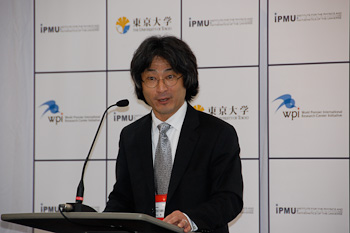 Director Murayama
Director Murayama
Director Hitoshi Murayama's speech
Ladies and Gentlemen, distinguished guests, colleagues, staff, and friends,
Thank you for being here today for the inauguration ceremony of our brand new building. This is a special moment for many of us. Dreams do not come true very often. Today, some dreams did come true.
As you know, IPMU, Institute for the Physics and Mathematics of the Universe, started about two and a half years ago. We literally started from scratch: no space, no staff, no building, no scientists; no nothing. Today, we have more than seventy full-time scientists, more than thirty staff. We exceeded the mark of a hundred members. Sixty percent of our scientific staff came from other nationalities. Even many Japanese members joined from abroad. English is spoken here everyday so that some of our non-Japanese members complain: I don’t get to practice my Japanese here!
We want to address five most fundamental questions about the Universe. How did the Universe begin; what is its fate; what is it made of; what are its fundamental laws; and why do we exist in it? We sit on the shoulders of the giants like Galileo. He told us “the Universe is written in the language of mathematics,” as it is inscribed on this obelisk. He debated openly with his colleagues and friends in Italian Piazzas like here, developing his theory. He was rumored to have dropped balls from the leaning tower of Pisa to prove his ideas experimentally. A word to our scientists: don’t try that here, but do it safely in the Kamioka mine, at the Subaru Telescope, and using the data from the LHC.
To make this happen, we needed a building. Without you (center), this project wouldn’t have come off the ground; it couldn’t have gone over many stumbling blocks on the way; it wouldn’t have been completed. Without you (right), this building couldn’t have been designed; built; equipped; or furnished. Without you (left), this building wouldn’t have become so attractive, inviting, and fun to be in. Without you (back), we couldn’t have pushed the project ahead; destroyed the volleyball court to build on; relied on your patience and support. Thank you all for enduring the pain of labor. This building was born. A dream has come true. I always tell people, “look how efficient this country is, this project would have taken five years in Berkeley, maybe never.”
And there is another dream that has come true today. It is you, the scientists. Without you, the shiny new building is useless, meaningless. It is the way you use this building that makes me happy. The way you come into your frigidly cold office in the morning because you love this building; the way you come back from lunch, get a cup of espresso and launch into discussions at the blackboards; the way you come to teatime everyday, eat cookies hand-baked by our volunteers, talk about life tips, food, hobbies, jobs, the seminar you’ve just sat through, the papers that came out today, and suddenly a small piece of idea, a glimpse of solutions you’ve been looking for to understand the Universe, the excitement, confusion, technical problems, and you spend the rest of the afternoon discussing them with your colleagues. This is why we built this building, this is the other dream that has come true today.
But there is another dream yet to come true. We created this institute to make a difference, within the University, in the community, in the eyes of the public, and in the history. We want to produce results that we can be proud of, an idea, an experiment, an image, a spectrum, a piece of data in our computer, out of this very building. We want to see the day when people say, our understanding of the Universe couldn’t have been the same without IPMU. This is the dream yet to come true.
To make this dream come true, we need your continued support from everybody in this room and beyond. Thank you all for this great day, and our great future. Thank you, thank you.
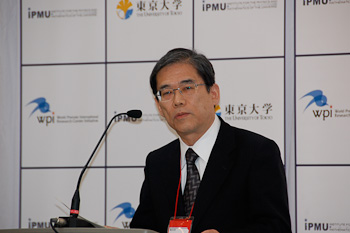 President Hamada
President Hamada
President Junichi Hamada's speech
Ladies and Gentlemen, distinguished guests, and colleagues.
It is such a pleasure to inaugurate the new IPMU research building today. Let me first express my wholehearted gratitude to all of you who worked on this project.
As you all know, IPMU, Institute for the Physics and Mathematics of the Universe was chosen as one of the five WPI centers back in 2007. IPMU addresses the most fundamental problems in basic science, such as nature of mysterious dark matter and dark energy that comprise 95% of the energy of the Universe. WPI stands for World Premier International Research Center Initiative, which tries to establish “globally visible research centers” by bringing topnotch researchers from around the world. It breaks completely new grounds in Japanese Universities. The University of Tokyo has committed itself to realize its vision by reforming the current system of the University, and I am personally committed towards this goal as well.
We were able to attract Prof. Hitoshi Murayama, a young dynamic leader in theoretical particle physics, from University of California Berkeley to create this new international institute. We decided that this Kashiwa campus, being developed as a new international campus of the University, was the right location for IPMU. To ensure maximum flexibility, we placed IPMU directly under the President’s Office. IPMU started literally from scratch on October 1, 2007. Since then, IPMU grew tremendously and is recognized very highly by the WPI program committee. This is because 60% of its scientific members are not Japanese and IPMU has the highest international visibility among the five WPI centers. I feel very proud of the success of IPMU as the head of its host institution, and I am extremely impressed by the continuing vigorous effort of Director Murayama. In addition, he brokered the recent agreement for exchanges in education and research between Berkeley and University of Tokyo, demonstrating his enhanced role in globalization of the University.
As the host institution, we are responsible to establish necessary infrastructure for IPMU. One of the biggest needs has been space with attractive research environment. We strived to construct such a building by making use of internal resources. It is a great pleasure for the entire University community to see the completion of the building today. It has a unique look and will surely become the landmark of the campus. It has extensive facilities for conferences and seminars. Right here in this room, IPMU members hold teatime every day where mathematicians, physicists, and astronomers freely exchange ideas beyond the traditional boundaries of their disciplines. I understand this kind of teatime has been a proven platform to catalyze intellectual productivity at first-class institutions in Europe and the United States. I’m convinced that many new exciting results will come out from this building and IPMU will soon become one of the critical components of the University as the “intellectual headquarter in the world.”
Second most important needs of IPMU have been the lack of accommodation for researchers from other countries. University has built the Kashiwa international lodge near this campus that will start operating soon, and we have allocated sixteen units to IPMU to help satisfying this need.
I have to say it is quite incredible that IPMU has attracted so many excellent non-Japanese scientists and ramped itself up so successfully while based on temporary space and lacking accommodations. Given this track record, we can be sure that IPMU now gains further momentum towards becoming a truly world-premier international research center.
Let me also add that the University will work further to provide needed infrastructure to IPMU. This year, we start working on a combined building for IPMU with Information Technology Center and Institute for Gerontology. I understand IPMU will use this additional space for computing center, outreach and education, and visitors.
Having met some of the most pressing needs on infrastructure, we must also consider other two important near-term issues. WPI centers are promised ten years of funding from MEXT assuming good results from the interim evaluation in their fifth year. There is even a possibility for extending the support from MEXT for additional five years for those with highest marks. However, MEXT demands the host institution to maintain WPI centers once their support declines or finishes, and has been pressing the University to come up with a clear plan. Another related issue is lack of tenure. Given that IPMU does not have any tenured positions, it makes recruiting of best scientists difficult, and the best people here may start to leave in the next few years. We have to do something about this.
The University has actually been discussing an interdisciplinary system of Institutes for Advanced Study as its permanent entity, and we are making progress towards its establishment. I express my commitment here that we will integrate IPMU into the University as one of such Institutes; sustain IPMU beyond the duration of the WPI funding; and give tenure to a part of the IPMU faculty without sacrificing the traditional University positions. This way, I believe the University can continue to support IPMU by addressing the most important near-term issues.
Finally, I would like to ask for understanding and support from all relevant parties to make IPMU live up to its full potential in producing excellent research and nurture next generation of scientists, promoting the University as the “intellectual headquarter in the world.” Thank you for your attention and congratulations to all of you.
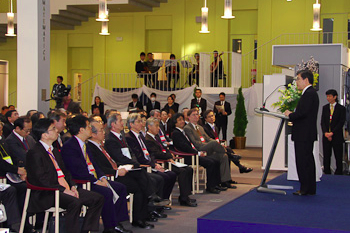 President Hamada
President Hamada
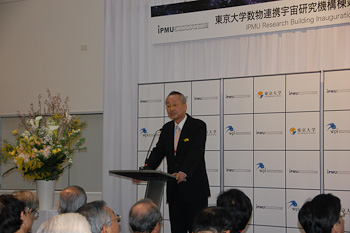 Professor Oono
Professor Oono
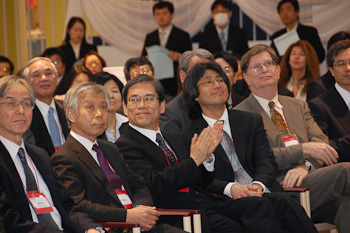
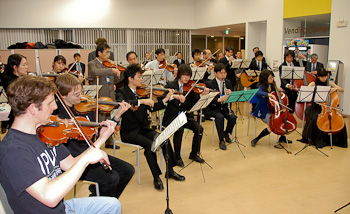 IPMU chamber orchestra
IPMU chamber orchestra






